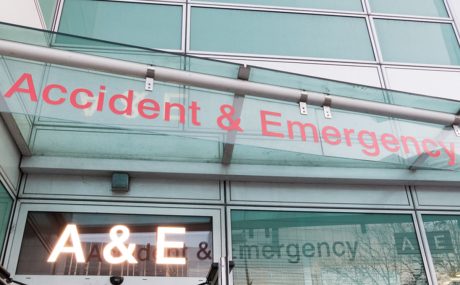Laura Weir secured a six-figure settlement for the executors of the estate of Mr H (deceased). As a result of the case, significant changes are being made to hospital trust protocols and staff training requirements.
Background
Mr H, then aged 78, had a fall on a bus on 14 January 2017 and was taken by ambulance to the local NHS hospital, complaining of lower neck pain and a history of “compression of nerves”. Mr H was seen by a doctor in the emergency department. Following a brief examination he was sent home in the early hours of 15 January 2017 without a scan being performed and without his neck being immobilised.
Mr H deteriorated during the course of the morning of 15 January 2017 and an ambulance was called. He was experiencing increased neck pain and had fallen, and he was having difficulty getting up off the floor.
Mr H returned to the local NHS hospital. He was again examined in the emergency department and it was noted that he had marked pain in the neck, which was worsening, and which was worse on movement. Mr H was struggling to get off a chair and referral was made for a therapy assessment. A discharge assessment was performed at 6.15pm. Mr H required assistance to stand and balance, but managed to walk two steps. He was considered unsafe to discharge following an Integrated Care Assessment and was eventually admitted.
At around 2.45am on 16 January 2017, Mr H attempted to sit at the edge of the bed to use a bottle to urinate but was unable to use his arms and legs. The A&E registrar attended urgently and his cervical spine was immobilised with collar and blocks. An urgent CT scan was arranged and on the request form it was noted worsening neck pain with weakness in the upper and lower limbs and intermittent paraesthesia in the fingers. An MRI subsequently confirmed the diagnosis of an unstable cervical fracture at C3-C4, with spinal cord damage. Following a full neurological assessment, it was determined that Mr H had acquired almost complete tetraplegia.
Mr H underwent a period of in-patient rehabilitation at Stoke Mandeville Hospital, before being transferred to the Raphael Hospital. He was subsequently discharged to the Peter Gidney Neurological Unit.
Mr H was tetraplegic, completely lost independence, required full assistance with all activities of daily living, had no bowel or bladder control, had a tracheostomy and lived for a period of time being tube fed.
Sadly, in August 2018 Mr H developed difficulty in breathing and was diagnosed with pneumonia. Following a period of unsuccessful antibiotic treatment, Mr H passed away on 30 August 2018 from pneumonia secondary to the tracheostomy and tetraplegia.
The legal case
Mr H’s case was taken on by Stewarts in December 2017, with Laura Weir, an associate, having conduct of the case. Independent expert evidence was obtained from doctors specialising in emergency medicine, neurosurgery and radiology. All the experts were critical of the failure to immobilise and scan Mr H’s cervical spine on both 14 and 15 January 2017 and of the delay in diagnosis of the unstable cervical fracture.
Mr H’s executors instructed Stewarts on Mr H’s death and a Letter of Claim was sent to the NHS trust. In their response, the trust admitted that there were failures on both 14 and 15 January 2017 to immobilise Mr H’s spine in the emergency department and to arrange appropriate imaging, which would have led to the diagnosis of the unstable cervical fracture and referral to a specialist team for further input.
However, the trust’s position was that even with appropriate treatment, Mr H’s clinical course would have been the same and that he would always have been rendered tetraplegic.
Laura Weir invited the trust to mediate Mr H’s case under the NHS Resolution Mediation Scheme.
Mediation
On 28 October 2019, the parties met for mediation. Aside from the medico-legal issues, the trust’s medical director and the team leader of the patient safety team at the NHS Resolution attended to apologise and to discuss lessons learned and changes made since Mr H’s attendance.
The trust has reiterated to its staff the importance of recognising the possibility of cervical injury and has implemented a new protocol which requires the admission, scanning and monitoring of all patients aged over 65 presenting at their emergency department with a suspected head or cervical injury. Alongside this, the trust has now implemented weekly protected teaching time and “daily huddles” for staff in the emergency department. Further, the team leader of the patient safety team at the NHS Resolution will be sharing the lessons learned with the NHS as a whole and has invited the executors to help by sharing Mr H’s story to demonstrate the immense impact these failings can have.
Following various legal discussions regarding each party’s position in respect of causation, a six-figure settlement was reached.
Testimonial from Mr H’s executors
“As Mr. H’s executors, my wife and I were determined to ensure that the legal proceedings commenced by Mr. H, while he was alive, with Laura Weir at Stewarts, were seen through to completion. Having witnessed Mr. H’s unnecessary and protracted suffering during his last 18 months of life, we believed it was essential that the NHS fully appreciated and took the necessary steps to rectify its serious failures in his care and treatment. We were convinced that this could only be achieved by the successful legal pursuit of this matter.
“Throughout this case we have been consistently impressed by the professionalism and levels of compassion and care shown by Laura Weir. Laura has left no stone unturned in pursuing this claim to its successful conclusion. She has always been available with a sympathetic ear and sage advice. We are also most grateful to the partners at Stewarts for their willingness to support us in pursuing this matter on behalf of Mr H’s estate.
“It is particularly satisfying to us to see that the patient safety team of NHS Resolutions have, as a direct result of Laura’s efforts, now noted the inexcusable errors made by various medical practitioners in Mr. H’s care and that they will now be ensuring that lessons are learnt with remedial guidelines and training being disseminated across the NHS as a whole.”
You can find further information regarding our expertise, experience and team on our Clinical Negligence pages.
If you require assistance from our team, please contact us or alternatively request a call back from one of our lawyers by submitting this form.
Subscribe – In order to receive our news straight to your inbox, subscribe here. Our newsletters are sent no more than once a month.





